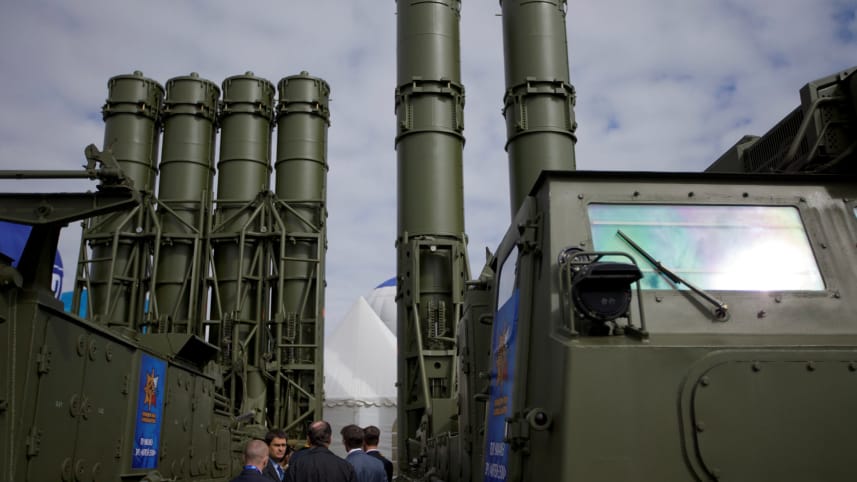Analysis/With Russia’s S-300 in Syria, Israel Will Have to Think Twice About the Next Strike
عاموس هاريل من الهآررتس: إسرائيل مضطرة لإعادة حساباتها بما يخص غارراتها على سوريا بوجود النظام الروسي للصواريخ اس 300 فيها
Amos Harel/Haaretz/September 25/18
The new missile system provided by Russia is not a total barrier to airstrikes, but Israeli jets’ freedom of action will be significantly curbed.
The two latest developments in Moscow – the Defense Ministry’s report that placed full responsibility for last week’s downing of a Russian plane over Syria on Israel, and the announcement of the transfer of advanced S-300 anti-aircraft missile systems to the Assad regime – shouldn’t surprise anyone in Israel except maybe a few foolish supporters of Prime Minister Benjamin Netanyahu. No matter how good his relations with Russian President Vladimir Putin may be, Netanyahu can’t make the problem disappear.
Russia suffered an embarrassing blow when Assad’s anti-aircraft fire shot down the plane, and it still has widespread interests to promote in Syria. It was quite clear that the affair would lead to a Russian condemnation of Israel and to demands of Israel. The bottom line still depends on Putin, who initially sufficed with a cautiously worded statement the day after the incident. For the time being it seems the result of the Russian steps will be a significant restriction of Israel’s freedom of action over Syria.
Russian Defense Minister Sergei Shoigu announced Monday that his country would supply Syria with S-300 ground-to-air missiles. Russia, he said, would also use electronic warfare systems to prevent the activation of satellite tracking systems along Syria’s coast, making it harder for Israel to conduct airstrikes. And Russia will equip Syrian anti-aircraft units with Russian tracking and guidance systems to prevent mishaps in which Syria downs Russian aircraft.
The transfer of S-300 missiles to the Syrians, along with even more advanced systems (like the S-400) that the Russians are deploying near their bases in Syria’s northwest, don’t constitute a total barrier to Israeli attacks. According to foreign media, the Israel Air Force has trained for missions in which Israeli jets must contend with S-300 batteries – which the Russians sold to Cyprus and are now in Greece’s hands. It’s reasonable to assume that the air force can figure out how to reduce the risk when facing these systems.
In April, after an American attack and a number of Israeli attacks, Moscow announced that it would sell the S-300 systems to Syria, but it didn’t follow through. This time the Russians seem more determined to follow through, though it’s doubtful the weapons will be delivered in two weeks as promised by Shoigu, and it could take the Syrians a while to learn to operate the technology.
The test for Israeli-Russian relations is sure to come soon when a new intelligence warning pops up about an Iranian attempt to smuggle arms into Lebanon on a route near the Russian bases in northwestern Syria. Because Iran is determined to continue with its arms shipments to Hezbollah, and Israel has insisted on its right to attack such shipments, Jerusalem is bound to face a dilemma: Should it attack once again near the Russians and risk further exacerbating the crisis and even the downing of an Israeli plane?
Russia’s announcement of the decision to supply the S-300s and its report Sunday on the circumstances of the downing of the Ilyushin plane underscore one point. Moscow can’t accuse the main culprit responsible for the incident – its ally, the Assad regime. (It’s amazing to see that blame for the Syrian anti-aircraft forces doesn’t even appear in the Defense Ministry’s official statement.)
It was therefore clear from the beginning that the responsibility would be placed on Israel. It’s also interesting that all the blame is directed at the Israeli military, which the Russians accuse of being unprofessional or “criminally negligent, at the very least.” The Israeli political leadership isn’t mentioned except for one general claim about Israel’s alleged dangerous offensive policy in Syria.
The Russian inquiry seems dubious; some of its claims are odd. For instance, the Russians say Israel gave them a warning of only one minute (it’s surprising that Israel hasn’t stated the real time lag, which was much longer). According to experienced Israeli pilots, the claim that the Israeli jets hid behind the Russian intelligence-gathering plane is unreasonable and not in keeping with accepted operational practices.
The accusation that Israel deceived the Russians about the location of the planned attack also seems illogical. According to Russia, the IAF informed it about an attack in northern Syria, while the attack occurred in western Syria. Latakia is in northwest Syria, as a quick glance at a map reveals. And because the military coordination has been working successfully for three years now, during which hundreds of Israeli attacks have taken place, it’s hard to believe that the two sides haven’t yet cleared up some basic terminology.
The Russian announcement accuses Israel of ungratefulness in light of Moscow’s steps on behalf of Israeli interests such as keeping Iranian forces from the Israeli border in the Golan Heights. (The Russians say they’ve kept them 140 kilometers [87 miles] away, while actually it’s 85 to 100 kilometers, a buffer zone that doesn’t include Damascus, where Iranian soldiers remain.)
In recent years, Russia has been caught lying or spreading disinformation about its role in a number of incidents, the most recent being its involvement in the U.S. presidential elections, the poisoning of the former Russian agent Sergei Skripal and his daughter in Britain, and the invasion of Crimea and eastern Ukraine. So it’s hard to believe that anyone but Syria and Iran will adopt the Russian version of last week’s events.
But it’s unlikely that this will matter. Moscow has the last word on the plane affair. It seems Putin waited for an Israeli blunder to put Jerusalem in its place.
This isn’t the end of an era for Israel’s military operations in Syria, where it has conducted hundreds of attacks in the north over the past six years. But for now, it appears the situation on the northern front won’t return fully to the conditions before the Russian plane was shot down.
Israel has operated freely in northern Syria for years thanks to the combination of offensive actions and good diplomatic relations with the Russians. Mostly, Israel acted shrewdly, achieving many of its goals.
In this handout video grab released by the Russian Defense Ministry speaks to the media next to the screen showing the scheme of the incident during a briefing in Moscow, Russia, September 22, 2018.
But in recent months Israel has displayed excessive confidence in Syria. It’s unlikely that the Russians were happy with the Israeli military’s announcement this month that it had conducted more than 200 attacks in Syria since the beginning of last year. It seems Jerusalem hasn’t fully grasped the implications now that the Assad regime, with the help of the Russians, has regained control of most of the country, including the region bordering Israel.
Israel isn’t a superpower and isn’t invincible. It will have to take into account Russian considerations and maybe even adapt its offensive model. Senior defense officials say they ascribe great importance to the latest incident. Those who still claim that this is just a mild shudder on the wing must be so busy defending Netanyahu’s image that they’re no longer capable of analyzing reality objectively.






















